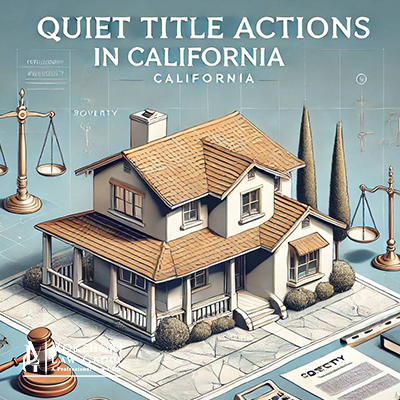
A quiet title action is a powerful legal tool used in California to resolve disputes over real property ownership or to clarify rights to a property. Governed by the California Code of Civil Procedure §§ 760.010 to 764.080, quiet title actions are typically pursued when adverse claims cloud a property’s title. These disputes, if left unresolved, can hinder sales, refinancing, or transfers of property.
This article provides an overview of quiet title actions, common scenarios requiring one, and a step-by-step guide to initiating and resolving these actions.
When Is a Quiet Title Action Appropriate?
Quiet title actions may be necessary in various circumstances, including:
- Boundary disputes: Disagreements about property lines or encroachments.
- Fraudulent conveyances: Claims involving forged deeds or transfers made under false pretenses.
- Adverse possession claims: Situations where someone occupies a property and claims ownership after a statutory period.
- Easement disputes: Issues with access rights, such as prescriptive or implied easements.
- Liens or encumbrances: Unresolved tax liens, mechanics’ liens, or other recorded claims that affect title.
- Errors in title or legal descriptions: Mistakes in recorded documents or surveys that create confusion over ownership.
- Inheritance disputes: Competing claims to property from heirs or beneficiaries.
- Foreclosure-related claims: Clarifying title after improper foreclosure proceedings.
- Co-ownership conflicts: Disputes over shared ownership, such as when one party wishes to sell or partition the property.
If you are dealing with any of these issues, a quiet title action may provide a legal resolution to protect your rights and clarify ownership.
Key Steps in a Quiet Title Action in California
Successfully pursuing a quiet title action involves several procedural and legal steps:
1. Consult an Experienced Real Estate Attorney
Quiet title actions are complex and often involve intricate legal arguments. Consulting a skilled attorney familiar with California real estate law is essential. An attorney can guide you through the process, ensure compliance with procedural requirements, and present a compelling case in court.
2. Verify the Complaint and Identify Defendants
- A quiet title complaint must be verified (signed under oath) and include:
- A legal description and street address of the property.
- The plaintiff’s ownership interest and claims to the property.
- Any adverse claims or interests to be addressed.
- The date for which the determination of title is sought.
- A prayer for judgment to quiet title against adverse claims.
You must name as defendants all individuals or entities with an actual or potential interest in the property, including those discoverable through title records or inspection.
3. File and Serve the Complaint
The quiet title action must be filed in the superior court of the county where the property is located. After filing, all named defendants must be served with the complaint. If a defendant cannot be located, service by publication may be permitted, but this requires court approval and documentation of reasonable efforts to locate the party.
4. Record a Notice of Pendency of Action (Lis Pendens)
A notice of pendency of action, also known as a lis pendens, must be recorded with the county recorder. This document notifies potential buyers or lenders that the property is subject to litigation, effectively preventing its transfer during the action.
5. Respond to Counterclaims or Defenses
Defendants may assert counterclaims or defenses, such as alleging superior ownership, fraud, or other legal theories. Be prepared to respond with evidence and legal arguments. Your attorney will help draft replies and navigate this phase effectively.
6. Prepare for Trial or Settlement
While many quiet title actions are resolved through settlement, some proceed to trial. At trial, both sides present evidence, witness testimony, and legal arguments. The court evaluates the case and issues a judgment based on the facts and applicable law.
7. Obtain and Record the Quiet Title Judgment
If the court rules in your favor, it will issue a quiet title judgment. This judgment:
- Establishes your ownership rights.
- Resolves all adverse claims.
- Creates a clear and marketable title.
Once recorded with the county recorder, the judgment binds all parties named in the action and provides certainty to future buyers or lenders.
Key Considerations for Quiet Title Actions
- Statute of Limitations: The timeframe to bring a quiet title action depends on the underlying claim. For example, a claim based on fraud has a three-year statute of limitations, while adverse possession claims require a five-year possession period.
- Possession and Laches: Generally, the statute of limitations does not run against a party in possession of the property. However, undue delay in filing a quiet title action may result in the claim being barred by the doctrine of laches if the delay causes prejudice to another party.
- Proof of Ownership: Plaintiffs must prove their title based on the strength of their claim, not the weakness of the defendant’s claim. Clear and convincing evidence is often required in cases involving disputed legal title.
- Verification Requirements: Both the complaint and any answer must be verified under oath, ensuring that the claims and defenses are made in good faith.
Why Hire a Real Estate Attorney for Your Quiet Title Action?
Quiet title actions are procedurally demanding and legally intricate. A knowledgeable real estate attorney can:
- Conduct a thorough title review and identify potential issues.
- Ensure compliance with California’s procedural requirements, including proper service and recordation.
- Represent you in negotiations, hearings, or trial to achieve a favorable outcome.
Contact Us for Help with Your Quiet Title Action
At the Vokshori Law Group, we specialize in real estate litigation, including quiet title actions in California. Whether you’re facing a boundary dispute, inheritance conflict, or title issue, our experienced attorneys are here to guide you through the process and protect your property rights.
Contact us today at (855) 855-2608 or visit www.VokLaw.com to schedule a consultation. Let us help you achieve clear title and peace of mind.






